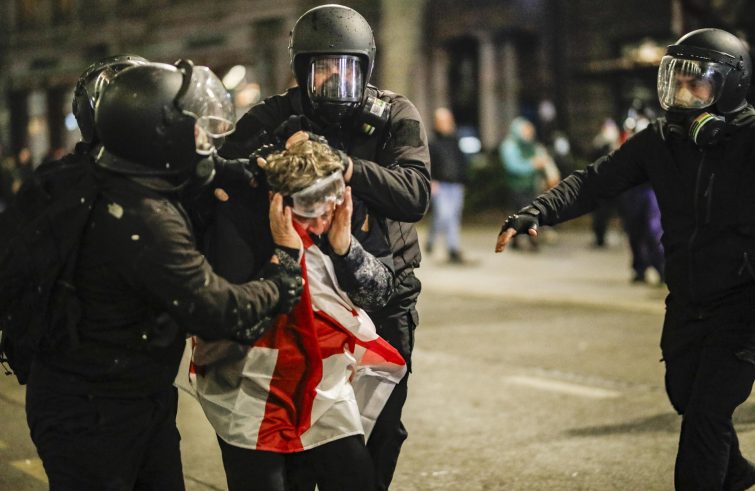
“Crowds of people packed the streets. It is a truly impressive sight. The situation could get out of control. Let us hope that nothing happens, that there will not be that one incident that could trigger a major conflagration.” Speaking to SIR over the phone from the city of Tblisi, now in a state of turmoil, Monsignor Giuseppe Pasotto, Apostolic Administrator of the Latin Caucasus, expresses his concerns. “Crowds of people, especially young people, have been flooding the main street of the city every evening, for the past five nights. And their numbers are increasing day by day. It is estimated that up to 100,000 people have taken to the streets. Tensions are mounting. While the first few evenings seemed quieter, tensions escalated after the police intervened and some protesters – whether they were infiltrators we do not know – reacted by stirring things up.”
“The atmosphere became increasingly tense after the elections, which were not recognised by a significant number of people and by the non-governing political parties”, remarks the Apostolic Administrator. “Furthermore, the Prime Minister announced that all talks on EU membership would be put on hold for the next four years, effectively freezing the path of accession negotiations. The population was incensed by this decision, which they regarded as a violation of the Constitution which requires all Georgian institutions to do everything in their power to secure Georgia’s European future.”
“The Prime Minister’s statement was perceived as a betrayal and indicative of a shift in policy that would no longer lead Georgia towards Europe but towards Moscow.”
It is young people in particular who are taking to the streets. “They are the protagonists of these protests and they are showing enormous strength. They shut down many universities on Monday. The protests start at 7pm and last until 7am. They stay in the streets for 14 to 12 hours. Most of the time there are clashes between the police and the protesters. But they don’t appear to be afraid. They walk towards the police. They resisted the water cannon; they remained soaking wet in the cold all night long. But they held their ground. There are also visible signs of growing solidarity. People can be seen bringing food and offering help. The resilience of these people standing in the streets for hours in these conditions is impressive.”
“I fear that the violence is intensifying. The protests are also spreading to other cities in the country.”
What does Europe mean for these young people? “Europe means newness, it means progress, freedom, it means looking to the future,” replies Pasotto. Then he adds: “I certainly do not represent the voice of the people who are demonstrating, but it has to be said that Europe also stands for a vocation that Georgia has consistently shown in recent years. In fact, it is not only young people who have taken to the streets. There are also adults, older people. Among them are those who protested 20 years ago to bring down Shevardnadze. In short, many people protesting have lived through the Soviet period and have no desire to fall back into that climate. We hope a way can be found. The government says they have every right to remain because they were elected.” Others say that “the only way the situation will change is if there are new elections.” But a real answer will largely be determined by the start of Trump’s presidency.
On Monday a public statement was issued by the small Catholic Church in Georgia. “Hard times are also times when it seems that we are heading for disaster and chaos, and yet, like labour pains, we also see signs of newness. As Christians we must have this certainty in our hearts. We are in God’s hands. Our Catholic Church in Georgia stands close to all those who, out of love for their country and their people, openly express their faith in truth, justice and the common good, which are the cornerstones of a truly human society.
Our Church stands united with all those who seek and propose paths of peace, non-violence and dialogue, and is especially concerned for those in our country who are suffer the most.
In our daily prayers we will entrust to our God who became man, as the forthcoming Christmas proclaims, the life of every man and of every woman, all of whom are precious and sacred lives in the heart of God.









